mozilla
Latest
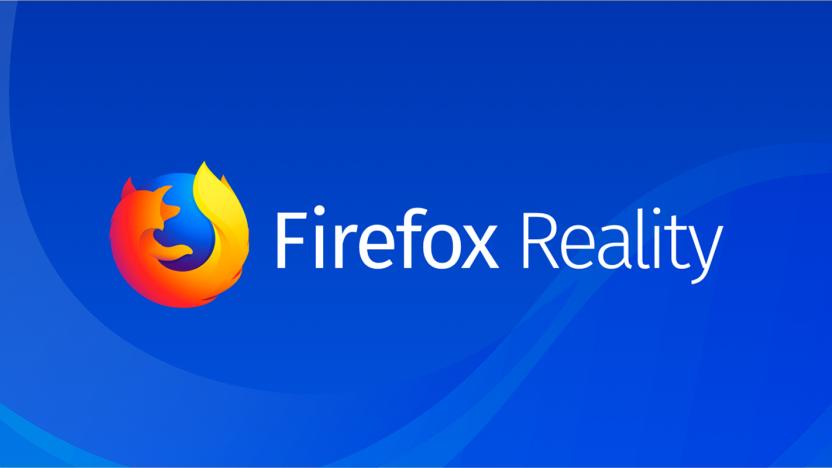
Mozilla is making a 'mixed reality' version of Firefox
Virtual and augmented reality hasn't taken off the way some people had hoped. Still, it's a growing market that Mozilla wants to support with a bespoke version of Firefox. The new browser, called Firefox Reality, will work on a variety of VR, AR and so-called "mixed reality" hardware. There's no word on a release date, though, or what the experience will look like. Mozilla has given a few clues, however; it will be open-source, for instance, and truly cross platform, unlike some of its rivals. It should also be fast, like Firefox Quantum, and offer better protection than native apps.

A new Firefox add-on limits Facebook tracking
It's safe to say that Facebook's treatment of its users' personal data is front and center, with the recent revelations about Cambridge Analytica. Many users are going as far as to stop using the social network altogether. But Mozilla has another option: It's created an add-on called Facebook Container for its Firefox browser that isolates Facebook from the rest of your browsing activity. That way, the social network can't track what you're doing elsewhere on the internet.

Mozilla pulled its Facebook ads and others may follow
Facebook is obviously in some very hot water as details regarding Cambridge Analytica's use of its users' data continue to unfold. And along with heated consumer backlash and questions from lawmakers, Facebook may now start to lose advertising money. Yesterday, Mozilla pulled its ads from Facebook, saying in a blog post about the decision that the Cambridge Analytica news "caused us to take a closer look at Facebook's current default privacy settings given that we support the platform with our advertising dollars. While we believe there is still more to learn, we found that its current default settings leave access open to a lot of data -- particularly with respect to settings for third party apps." And because of that, it has chosen to halt advertising on the platform for the time being.

Firefox can block pesky site notification requests
Website push notifications can be helpful. The way you're asked to enable those notifications? Not so much -- the constant requests can drive you up the wall when you're just trying to check the latest news. Mozilla is coming to your rescue. Its newly released Firefox 59 for the desktop gives you the option to block notification requests. You can also tell the browser to block requests to use your hardware or location, for that matter. You'll have to dig deep into the settings (it's under permissions) to turn these features off, but they should make your web surfing relatively hassle-free.

Firefox faces backlash for auto-installing 'Mr. Robot' add-on
A curious add-on called "Looking Glass" started popping up on Firefox for a number of users this past week -- even if they didn't give the browser permission to install it. Due to its nebulous nature and creepy description that only said "MY REALITY IS JUST DIFFERENT FROM YOURS," people took to social networks to ask other users and air their concerns. Turns out Looking Glass isn't spamware, malware or any of the sort: it's a promotional campaign for Mr. Robot, a TV series about the life of a cybersecurity-engineer-slash-hacker.
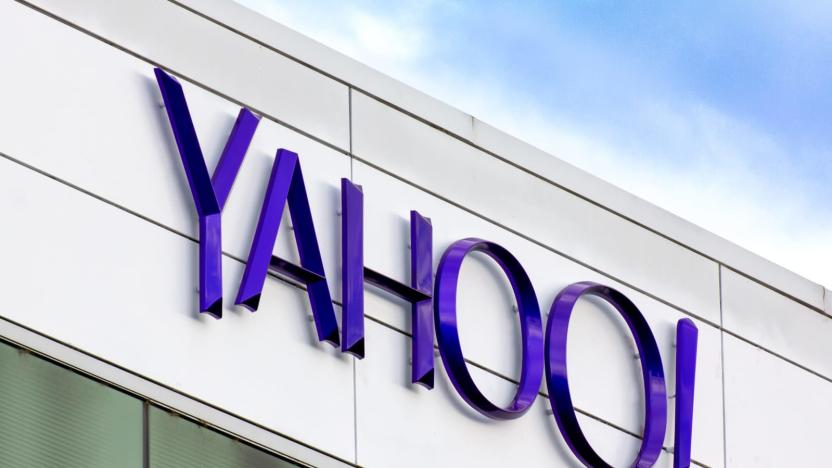
Mozilla and Yahoo sue each other over default search engine deal
Deals between web browser suppliers and search engine providers are big business. For Mozilla, agreements with search engines have brought in as much as US$300 million a year, which accounts for 90 percent of its income. So the stakes are high amid the latest tech company quarrel, which sees Mozilla end its partnership with Yahoo due to claims it hadn't been paid. Neither party is happy with the situation, so they're suing each other.
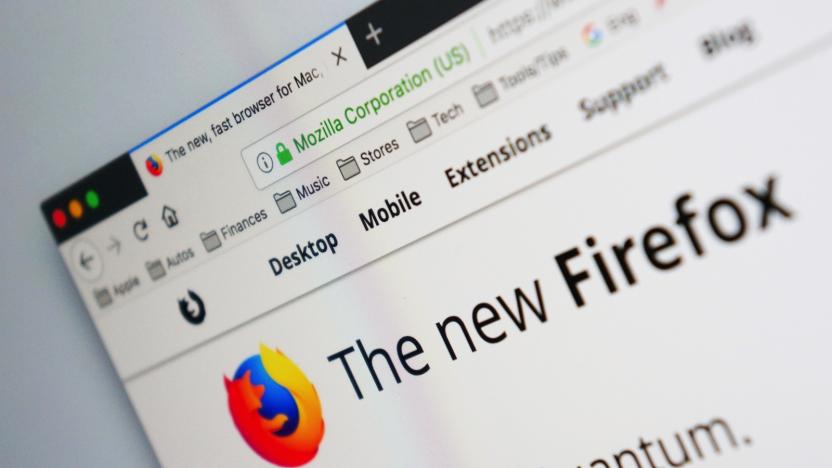
Firefox Quantum is ready to speed up your web browsing
Did you ditch Firefox a while ago after feeling that it was slowing down compared to rival browsers like Chrome? Mozilla is determined to win you back. As promised, it just released Firefox Quantum (aka Firefox 57) -- and it promises to be much faster than you're used to. The company claims its newest browser is over twice as fast as the version from 6 months ago thanks to both a new, multi-core CSS engine, tab prioritization and the elimination of bugs that were weighing the software down. Whether or not it's actually faster depends on the sites you're visiting, but it does appear snappy in some quick testing.

Firefox can add web apps to your Android home screen
Firefox is making it easier for Android users to navigate the mobile web with Web App Manifest support, which will ship with Firefox 58 for Android. The feature supports Progressive Web Apps (PWA), the app-like interfaces displayed within mobile web browsers, and will allow users to add them to their home screens so they can be accessed by a single touch (rather than via web search or URL input).

LastPass add-on beta prepares for upcoming changes in Firefox
Mozilla has some big changes in store for its next browser release, Firefox 57, on November 14th. It will introduce quite a few new features, including Firefox Quantum, which is twice as fast as Firefox was a year ago and 30 percent more RAM efficient as compared to Google Chrome. One of the changes is the switch to WebExtension, which is an API that allows for development of extensions across browsers. LastPass, the popular password management system, has been toiling away to make their add-on work on the new system. Today, the company released a public beta for use in Firefox that's compatible with WebExtension. LastPass also announced that the final version will be available when Firefox 57 makes its debut. Beta users will automatically be transitioned to the final release when that happens.
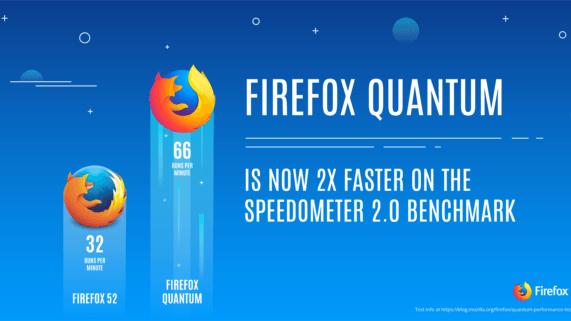
Firefox Quantum beta promises to double your browser speeds
After announcing plans for Project Quantum late last year, Mozilla has now launched its overhauled Firefox in beta stage, making it an increasingly imminent challenge to Chrome. And it's a very feasible challenge too, given the browser's improvements. Speed is its main selling point -- Mozilla says Quantum is roughly twice as fast as Firefox was a year ago. This is largely due to a new CSS engine written in Mozilla's programming language, Rust, which operates across cores rather than as a single memory-hungry process on one core. It also priorities tabs, loading up in-use tabs before background ones, which Mozilla says makes Quantum 30 percent more RAM-efficient than Chrome. The team has also tracked down and eliminated 469 bugs that were contributing to slowness.

The next version of Firefox will include support for VR
Mozilla has been working on VR for a while now, with support for Oculus Rift in the Firefox nightly builds as far back as 2015. Currently announced at the end of July and set to start rolling out live on August 8th, the latest version of Firefox (55) is set to include WebVR, the technology that puts virtual reality into a web browser. This addition will bring Firefox up to par with both Google Chrome and Microsoft Edge, which added web-based VR support in February and April of this year, respectively.

Mozilla file sharing test wipes files after one download
The files you share online tend to linger around in the cloud. But what if you don't like the possibility that someone might swipe your files after you're done? Mozilla is offering an answer -- it just introduced an experimental website, Send, that lets you send large files (up to 1GB) to someone without worrying that someone else might grab them. Files not only stick around for a maximum 24 hours, they disappear the moment your recipient finishes their download. You don't have to remember to delete the file, or worry about an after-the-fact hack. This concept isn't completely new, but the drag-and-drop simplicity combined with Mozilla's recognition makes it intriguing.

Flash was useful, but developers are glad it’s on the death march
Earlier this week, Adobe announced it would cease support and development of Flash at the end of 2020, a decision that had many people saying, "Finally." The "Flash is dead" rhetoric has been around for years, and people like Facebook's chief security officer, Alex Stamos, have called for Adobe to set an end-of-life date for some time. Well, it finally has, and Adobe tells Engadget that the transition out has been planned for several years.
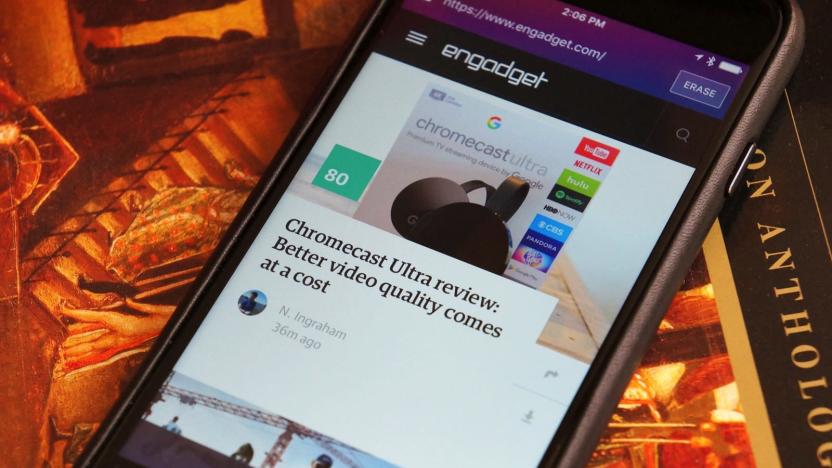
Mozilla's new Firefox features improve browsing on iOS and Android
Firefox is adding a few quality-of-life features to its mobile browsers. To celebrate hitting one million downloads in the month since it launched, the minimalistic, privacy-intensive Firefox Focus for Android now lets users download files, supports full-screen video and enables opening the browser right from notifications.

Privacy-minded Firefox Focus browser comes to Android
If you liked the privacy-centric surfing of Mozilla's Firefox Focus browser but wished it were available for your Google-powered phone, you're in luck. Mozilla has released an Android version of Focus that, like its iOS counterpart, blocks ad trackers to both limit nosy marketers and (in some cases) speed up browsing. You can also slap an "erase" button to remove what few traces of your activity are left.
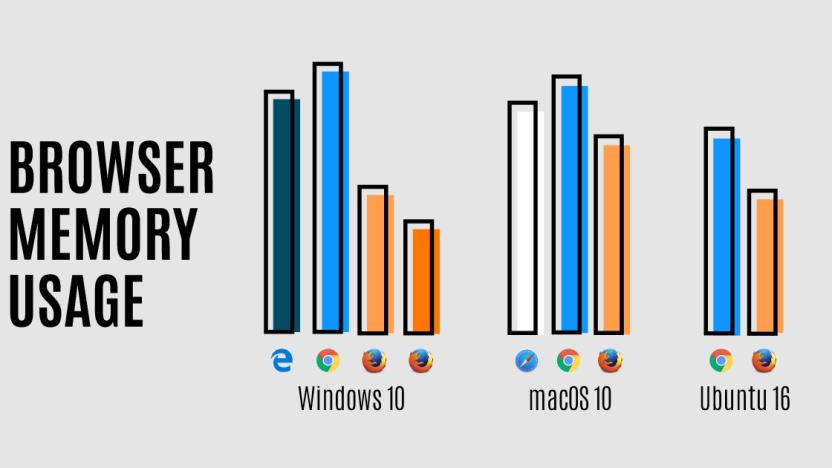
Firefox finally unveils its faster, more memory-efficient browser
The team behind open-source browser Firefox has released a much-awaited version that promises to be faster and less of a memory hog. Version 54 is the first to use "multiple process" tech that has been available for a while now on Chrome, Safari, Edge and other browsers. Now, Firefox tabs running heavy, complex websites will impact other tabs less, making the web run better overall on Windows, Mac and mobile devices.

Amazon, ACLU back net neutrality 'day of action' on July 12th
Many tech advocates and companies aren't happy that the FCC is planning to gut net neutrality, and they're determined to make their voices heard. The non-profit group has declared July 12th a "day of action" where companies and organizations will show support for a fair and competitive internet. It's not certain just what those protests will entail, but there are plenty of recognizable names involved. Amazon, Etsy, Kickstarter, Mozilla, Reddit and Vimeo are among the companies throwing their weight around, while groups like the American Civil Liberties Union, the Electronic Frontier Foundation and Greenpeace are also showing solidarity.

Javascript creator's browser raises $35 million in 30 seconds
You may remember Brendan Eich, the former CEO of Mozilla who stepped down amid political backlash surrounding his support for an anti-gay marriage bill in California. Well, he's back, and he has cash to burn: His new browser startup, Brave, raised $35 million in under 30 seconds, reports TechCrunch. He was able to accomplish such a dramatic feat because of initial coin offerings, or ICOs. It's similar to an IPO (initial public offering) that occurs when a private company sells stock to the public for the first time. An ICO fundraises for a company but uses cryptocurrency rather than traditional cash.
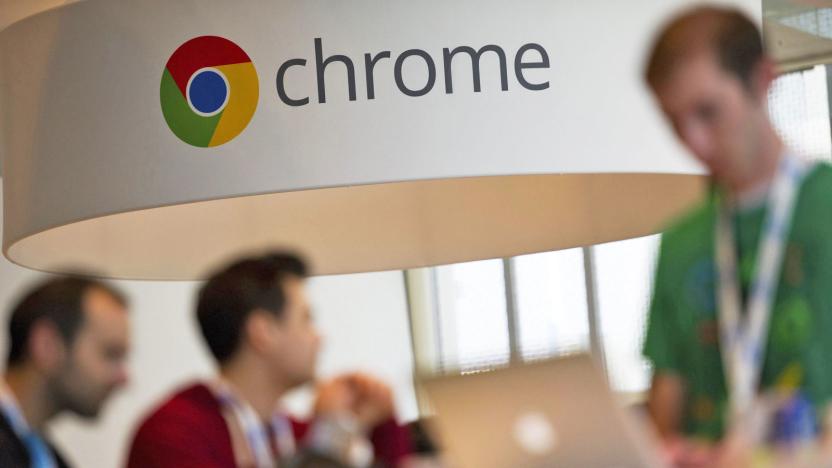
Google is fixing a Chrome flaw that makes phishing easy
As we've seen in the past, a strong password doesn't automatically make people safe online. Often, a specially-crafted email is all that it takes for someone to hand over their digital life to a malicious third party. Although email services are doing more to filter phishing emails before they reach your inbox, a decades-old unicode technique is making it hard for users to determine whether a destination is legitimate. Fortunately, Microsoft Edge, Internet Explorer and Safari are immune and Google is just days away from patching the flaw.

WikiLeaks won't share CIA exploits unless companies meet terms
WikiLeaks offered to work with tech companies to patch the CIA's leaked security exploits, but there has been a whole lot of silence ever since. Why? That depends on who you ask. Motherboard sources claim that WikiLeaks "made demands" of the companies before it would hand over necessary details of the vulnerabilities, including a requirement that they promise to issue security patches within 90 days. Potential fixes are reportedly stuck in legal limbo, the tipsters say, as the companies are worried about writing patches based on leaked info, not to mention the origins of the leak. They're worried that Russia might have been responsible for forwarding the info.









